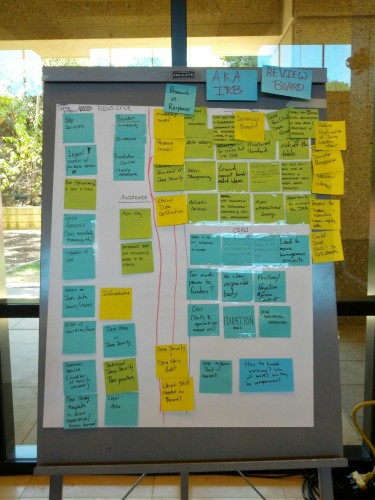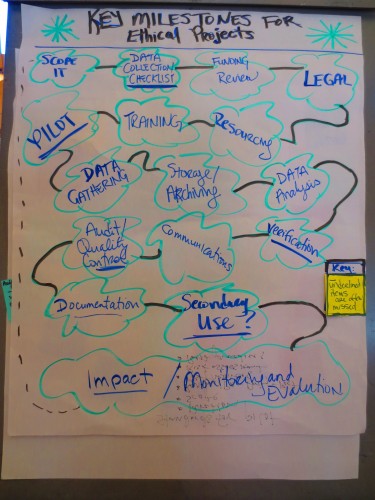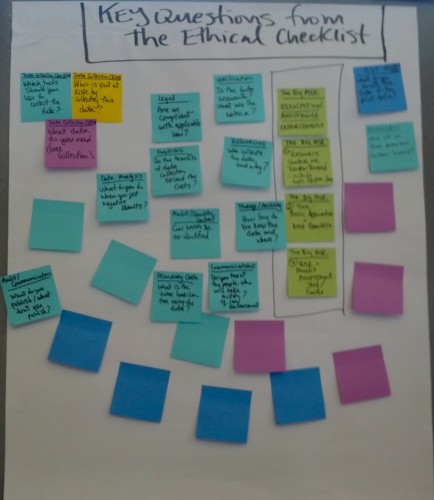Education, assistance and enforcement are needed to build better, ethically balanced data-driven projects. The Ethics of Data workshop on the Data lifecycle discussed ethical scenarios and key aspects of a data-driven project. This lead to many sticky notes and attempts to create the big asks and some outputs. The participants came from many different disciplines, which helped us quality check and inform our review.
Our group together created 3 asks for further review:
- Resources: This should be a center online for people and NGOs to share and find guides on building ethical data driven projects.
- Tool/Template: There should be a data risk/benefits/costs template as part of every grant application to build better ethical projects from front to back.
- Review: Could there be a non-profit assistance group that provides free, consultation on ethical questions? How would they enforce standards? Could it be like a review board for research projects?
Milestones for an Ethical Data Project:
We created over 100 ideas and grouped them into categories as milestones. There should be checklists for each milestone including key questions for the team. While the EoD team started on the mini-ethical checklists, this really needs more iteration. We also highlighted some milestones that are often overlooked or underfunded such as: a data collection checklist, pilot, quality control, verification, documentation, secondary use and impact/monitoring & evaluation. One other observation in our conversations was proper project management skills to scope many of the ethical minefields in advance of the project pilot.
*****
Without trying to influence the room, the key project milestones resemble the toolkits we created at Ushahidi. Toolkits, including the Ushahidi one, do need to include more ethical statements/checklists to improve the success of building better projects. But, toolkits are only as useful as those who use and enforce them.
Infuse with Ethical Checklists
We gifted the Responsible Data Forum with a list of 70 questions, terms and ideas for the key milestones. If all the various milestones of a data-driven project are infused with ethical questions, checklists, and recommendations, this resource would be incredibly useful. Participants suggested that the checklists start with very generic items, but be broken out into topical domain recommendations/checklist items. This is to ensure adoption and remix in diverse fields from human rights to health to science. Some of the questions that really drove conversations included:
Data analysis: What do you do when your data analysis provides negative results (from your hypothesis)? Quality Control: Can the data be re-identified? Resourcing: Who can collect the data and why? Secondary data: What is the time horizon on the data and future use criteria?
Ethics of Data – Resource Center / Review Board:
One of the outputs of our first day of brainstorming was the need to have an Ethical Resource and Review Board. The team split off to debate the pros and cons of this idea. They even determined some of the needed services such as legal referral.

More resources:
The EofD team recreated a list of additional Ethics reading. It might keep you up all night with worry, but better to be ‘in the know’.
As well, here is a compilation on Domain-specific digital ethics, practices, and conventions. The one that really opened my mind was the Bellagio Framework: “Big Data, Communities and Ethical Resilience: A Framework for Action.” They provided criteria to consider: Governance, Place, Socio-Cultural Context, Science, and Technology.
Thank you
Thanks to our hosts at Stanford Center for Philanthropy and Civil Society (Kim Meredith, Lucy Bernholz, Rob Reich and Sam Spiewak) for making the Ethics of Data event possible. Thanks to my co-host Patrick Vinck of Harvard Humanitarian Initiative for great conversations. As always, Aspiration (Gunner and Misty) supported us with facilitation that inspired a collaborative and productive event for all. And, lastly, thank you to all the participants for being so thoughtful and inspiring teachers as we all trundle down this journey to bring better decision-making to all of our work.
(Note: It is my hope that we can infuse HOT with some of this work and trial some ideas in our work. I’ll be sharing it with my fellow Board members and the HOT Community.)


4 comments
Pingback: Where is Big Data’s soul? : The ethics of data in civil society | Network Impact
Pingback: The Big Picture: Key Milestones and Questions for Ethical Data Projects — Responsible Data Forum
Pingback: Computers that Think and our Role | Text on Techs
Pingback: @mistavila » Curating the Spots